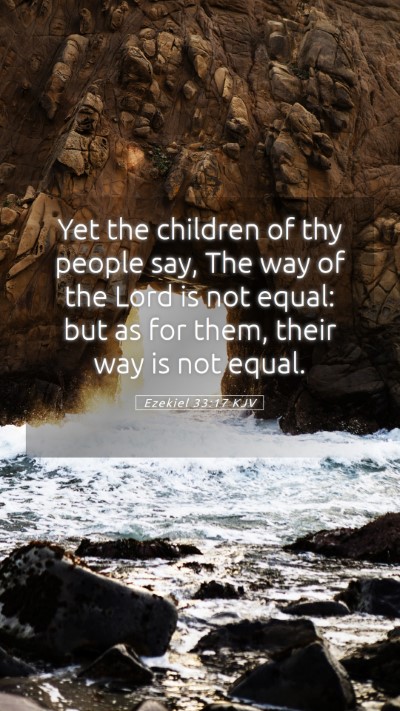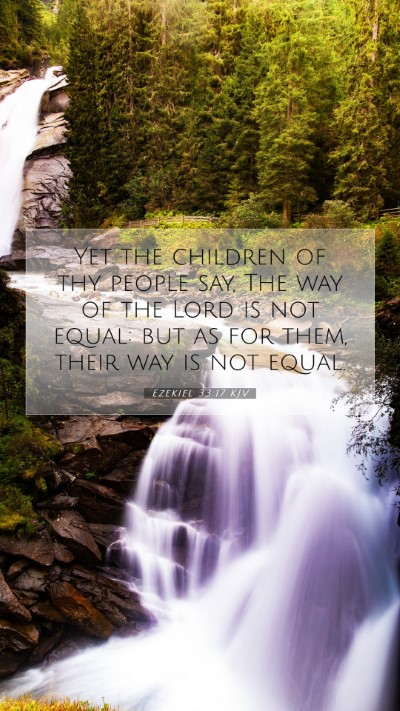Ezekiel 33:17 - Understanding the Scripture
Bible Verse: Ezekiel 33:17 states, "Yet the children of thy people say, The way of the Lord is not equal: but as for them, their way is not equal."
Meaning and Explanation
This verse reflects a deep concern about the perceptions of justice and fairness in the actions of God among His people. It highlights the tendency of individuals to accuse God of injustice while ignoring their own shortcomings and moral failings. The verse is a poignant reminder of human nature and the pitfalls of a self-centered viewpoint.
Insights from Public Domain Commentaries
-
Matthew Henry:
Henry emphasizes the hypocrisy of the people, who judge God as unjust without recognizing their own inequities. He points out that their complaint reveals a lack of understanding of God's righteousness and fidelity to His promises. The focus is on the necessity of self-examination and repentance rather than blaming God for perceived inequalities.
-
Albert Barnes:
Barnes discusses the implications of the people's claims against God's justice. According to him, their assertion that God's ways are not equal is a misinterpretation of His dealings with humanity. He stresses the importance of realizing that God's judgment is always fair and just, even when it may not align with human expectations or understandings.
-
Adam Clarke:
Clarke elaborates on the nature of God's justice as it pertains to individual accountability. He suggests that the children of Israel were guilty of projecting their own moral failures onto God’s character. Clarke encourages the reader to seek a deeper understanding of God's plans, which are often beyond human comprehension, and to place faith in His righteousness instead of questioning it.
Scholarship and Context
Ezekiel 33 is a critical section of the book that deals with the responsibilities of a watchman and the collective accountability of the nation of Israel. The chapter addresses the consequences of both personal and communal sins, reminding the people of their obligation to uphold justice and righteousness. This particular verse serves as a pivotal moment in the text where the prophet confronts the people about their flawed perceptions of God’s nature.
Application of the Verse in Daily Life
In examining Ezekiel 33:17, believers are encouraged to reflect on their perceptions of divine justice and fairness. Common applications include:
- Self-Reflection: Instead of blaming God for life’s challenges or inequalities, individuals are urged to consider their own actions and ethics.
- Faith in Divine Justice: Trusting that God’s judgments are always just and true, even when they do not align with personal understanding or circumstances.
- Encouragement to Others: Sharing insights from Scripture can help community members recognize the importance of accountability and the misinterpretation of God’s character.
Related Bible Cross References
- Isaiah 55:8-9: "For my thoughts are not your thoughts, neither are your ways my ways," says the Lord.
- Romans 3:5-6: Addresses the righteousness of God and human sinfulness.
- Matthew 7:2: "For with what judgment you judge, you will be judged; and with the measure you use, it will be measured back to you."
Conclusion
The implications of Ezekiel 33:17 are profound for both personal and communal faith journeys. Through careful bible verse interpretation and scripture analysis, readers come to understand the importance of recognizing their own shortcomings before casting judgment on God. This comprehensive bible verse commentary encourages believers to pursue a deeper understanding of the meaning of Bible verses and their practical application in life.


